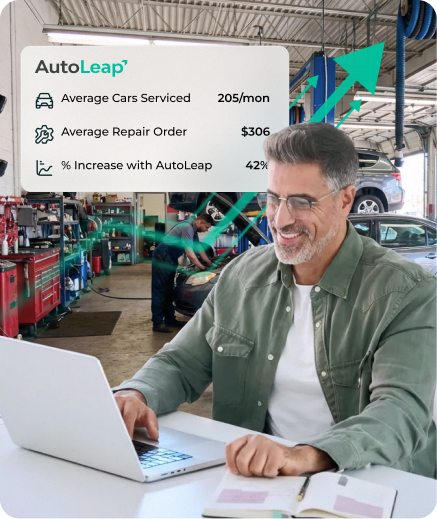Your revenue continues to climb and the shop is doing well. This is precisely when many shop owners start thinking about expansion. One such way to do this is by franchising your auto repair business.
Franchising has many benefits. Most shop owners are attracted to it because of the low investment and high revenue opportunity. With that said, it’s still not right for everyone.
So, how do you know? This blog post will explore automotive repair franchises, their pros & cons, and whether they are a good fit for expanding your business.
Schedule a free demo today!

Boost your shop sales

Simplify shop management

Empower your technicians
What is franchising?
Franchising is a way for businesses to distribute their services with the help of partners or dealers. These partners are known as franchisees that manage the distributed service. The arrangement allows them to:
- Use your operational model and processes
- Sell the same products and services
- Provide services under your brand name
- Pay an initial investment and annual royalty fees in exchange for the benefits
Let’s take a look at some popular auto repair shop franchises.
Popular franchises in the U.S.
Several businesses have expanded across the U.S. on the back of their franchisees. Here’s a look at some of the top auto repair franchises in the market.
1. Big O Tires
- Franchise units: 395
- Royalty fees: 2-5%
Big O Tires was founded in 1962 and started franchising 20 years later. They feature over 395 franchise units that bring in up to 5% in royalty fees per unit per year. The business is selective about who they partner with.
2. Carstar
- Franchise units: 533
- Royalty fees: 1.5%+
Carstar was founded in 1989 and started franchising in the same year. The institution now exists in over 650 locations across the U.S. and earns royalty fees from 533 of these without the hassle of having to run them.
3. Midas
- Franchise units: 2020
- Royalty fees: 10%
Midas was founded in 1954 and started franchising in 1956. In nearly 70 years, they’ve built a whopping 2020 franchises that each pay up to 10% in annual royalty fees. And these are all the units they aren’t even managing!
Franchising your automotive business is a strategic move. But it’s not for everyone. Let’s explore the advantages and disadvantages before you make the plunge.
The pros

There are many advantages to franchising your auto repair business. The best part is that you can have franchisees sell your repair services and help you grow your shop’s visibility without investing in new branches.
1. Rapid expansion
Franchising is perhaps the fastest way to expand an established auto repair shop. You don’t need to worry about the investment or look into finding the right location. Each franchisee invests their funds to set up and run individual car repair franchises, which can lead to faster growth.
2. Greater brand recall
An automotive repair franchise can help you take your brand name far and wide. You’re able to introduce your services to new locations and demographics.
This also serves as low-cost but effective marketing for your brand. Remember, a strong brand attracts customers and generates greater trust in new markets. Ultimately, these things boil down to greater brand recognition and trust. Your name is the first one that pops into a new customer’s head when their vehicle needs repairs.
3. Shared investment
Auto repair shops are expensive to open up. The equipment costs a lot, talent is hard to find, and shop rents continue soaring. In these conditions, franchising offers the perfect low-cost option for business expansion.
Your franchisee bears most of the costs for opening and running a new location, including rent, equipment, and employee salaries. This means you don’t have to wait to save on a substantial capital investment before opening up your next location.
4. Local expertise
Expanding to new localities comes with its challenges. You aren’t aware of local trends, needs and sometimes even vehicles.
But with a franchise, you partner with people that have local knowledge and connections. They can bring all their expertise to your new branch, hire mechanics familiar with your specializations, and stock up on the necessary equipment. They know the area well and can tailor your business offerings to local preferences.
5. Motivated owners
Auto repair shop franchises have a vested interest in the success of their locations, which indirectly means they’re invested in the success of your overall brand. This dedication also translates into higher levels of motivation, commitment, and dedication to customer service.
6. Growth
As your franchise network grows and your brand recognition increases, you can negotiate better deals with suppliers and create new partnerships. This lowers procurement costs for both you and your franchises. Additionally, your franchises bring you more franchises over time as your business expands to new localities and builds a name for itself.
The cons

The pros are great! But franchising is still not for everyone. Businesses still trying to make a name for themselves or aren’t widely known can struggle with franchising.
Here’s a look at some caveats that will help you make an informed decision.
1. Quality control concerns
With a franchise network, you’re no longer the only captain at the helm of your ship. Your franchisees can call their shots at their shop locations.
While you’ll maintain certain standards and guidelines, your franchises will have autonomy to make day-to-day decisions. It’s also important to note that you can try implementing your guidelines, but if the franchise owner isn’t too keen on them, they won’t implement them.
This leads us to the concern of quality control. Providing the same service at every auto shop location can be challenging. A single poorly performing franchise can negatively impact the overall brand reputation and damage business for other franchise owners.
2. Legal & regulatory concerns
Each franchise agreement requires legal agreements, regulations, and disclosures that can be complex and require legal expertise. Non-compliance can lead to legal disputes and damage the brand’s reputation. You might even run the risk of exposing intellectual property.
3. Initial investment
While adding a new franchisee to your auto shop franchise network requires low costs, setting up the initial system is expensive. Invest in developing training programs, creating operation manuals, providing marketing materials, and sharing support infrastructure.
These are important to ensure consistency across every location and that every new partner understands your expectations for customer experiences.
4. Franchise management
As a business owner, you need to manage your franchises and make sure there’s healthy communication. Franchisee-franchisor conflicts may happen, ranging from disagreements over services or the fees you charge. Managing these conflicts can be time-consuming and may strain relationships.
Managing franchises with AutoLeap
We covered the issue of quality control for franchising your auto repair business. As the franchiser, you’ll only have limited visibility into the operations of your car repair franchises. And when you don’t know what’s going wrong, you won’t know how to fix it.
Thankfully, there’s a clear solution! AutoLeap helps auto shops expand their business with franchise management. You’re able to:
- Track workflows for each location
- Maintain control over inventory & employee scheduling
- Monitor customer appointments and experience
- Oversee financial management
- And much more
» Looking to transform your shop? Discover how AutoLeap can help.
Final thoughts
Deciding whether to franchise your auto repair business depends on your goals, resources, and risk tolerance. On one hand, you can gain rapid growth and build brand recognition. But on the other hand, you run the risk of damaging the name you’ve made for yourself. Often, it’s more about finding the right timing and investing in the right training before you build an auto shop franchise network.
These pros and cons can help you evaluate your business when the time feels right. Franchise consultants and legal professionals can also help you make an informed choice that best aligns with your shop goals.









